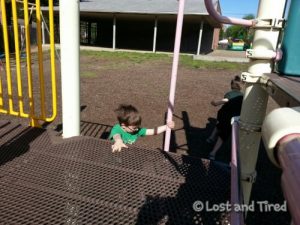I thought this was something that might benefit other families so I decided that I would share it here on Lost and Tired. If you are a regular reader then you have probably already seen many of the videos I have posted pertaining to my oldest son, Gavin, and his meltdowns.
For many years we have been dealing or rather, trying to deal with these meltdowns.
Over the years they have become much more aggressive and potentially dangerous, not to mention disruptive and often times destructive. When he has these meltdowns, he is essentially holding the people in the house hostage. He doesn’t seem to show regard for how this behavior negatively impacts the people around him and that is something that I’m trying to address.
I have always said that I believe Gavin has at least some control over these meltdowns. As time has passed, I have grown to realize that many times, these meltdowns, at least in Gavin’s case, are willful acts. I have also struggled with how to deter these unwanted or inappropriate behaviors. With all that said, here is what I have noticed about Gavin during these meltdowns.
Gavin will appear to lose control and just sink into the meltdown. However, I have discovered, that while he appears to be out of control, at least part of this is a willful act. By willful act, I mean that he is basically making the choice to have the meltdown. I feel comfortable saying this about Gavin because, he seems to have the ability to stop the meltdown on a dime and start right back up again.
Last week I noticed that as Gavin was getting ready to explode into a meltdown that he stopped and carefully put aside his prized Lego ship so that nothing happened to it. After that went right back to his meltdown. I decided that I would try something new and make him hold his Lego ship during these meltdowns and see how that would affect his willingness to continue.
What I found was very interesting.
While he was content to disrupt, terrify his siblings and destroy other peoples property, he was quite careful not to do so to his own. That is where the Lego ship came into play. I thought that as long as he was choosing to do these things that he should have something to lose as well. Instead of making him sit on his hands (for safety reasons) and cross his legs (also for safety reasons), I decided that he would hold his Lego ship with both hands.
This way, if he continues the meltdown, there are very real and very natural consequences for doing so. Those consequences would be the possible destruction of his Lego creations. You can see in the video below that he will appear completely out of control. However, the moment a piece of his ship falls off, he stops the meltdown in order to put his ship back together. Once it’s repaired, he picks up the meltdown, right where he left off.
Does this mean he has control?
In my opinion, this means that he has at least some control. As you watch the video, you’ll see a few examples of this. It gets to the point that I finally tell him, I will be keeping any pieces that fall off and he will have to earn them back and a later time. I believe this to be a very effective and natural consequence for his deliberate actions.
-Note-This video is meant for educational purposes and not intended to make Gavin look bad. My goal is to help others out there struggling with the same thing. Perhaps something you see in this video can help you to better understand and/or manage the meltdowns in your life. i want to be very clear when I say that Gavin is a great kid and I love him very much. with that said, the behaviors are a major problem. I understand the difference between to the two, I hope you can as well.
[youtube width=”720″ height=”480″]http://www.youtube.com/watch?v=QujUjcqTlgE[/youtube]



I noticed that his meltdown didn't seem as severe as some others I have seen videos of that you've posted. He definitely seemed in control of this one but my question is this…I know I can be having a meltdown and it can be "overridden" by my need for organization. Even in the middle of being angry and yelling, I can be cleaning or folding or straightening things, whether they are mine or not. I don't know if perhaps his need to keep his toy together (organized) was greater than his attention to the meltdown or not. I'm just sort of thinking outloud. I hope that this helps.
🙂
V
My recent post Plucking the strings…
What an interesting read!! I must say its definitely a strategy I’ll be trying here at home. It seems to be the season for meltdowns! My 4 year old ASD son has started having copious amounts of meltdowns lately – getting more aggressive towards himself & myself each time!! Fingers crossed this strategy works! Thank you!
I got my children dogs after seeing this movie: http://en.wikipedia.org/wiki/After_Thomas
I got my children dogs after seeing this movie: http://en.wikipedia.org/wiki/After_Thomas
My two children really responded to their dogs. When our puppies came home (1 per child), my children related to them as nothing else and would do anything for their dogs. Learning time-management skills, care-taking skills,and being responsible for their dog brought my children much satisfaction and pride. They learned these skills, and more, for their dogs, but the skills are universal life-skills.
Good article.
ASD children don’t connect to the world the same way neural-typical children do. A neural-typical child will respond to disapproval and time-outs; intangible consequences that depend upon normal facial/body language reading ability.
I have always used objects/activities that my ‘Aspies’ value as hostage to their good behaviour. Each ASD child values different things/respond to different things. Find what your child values/responds to and use it to modify their behaviour.
Dangling the carrot at the end of the stick works.
I read every blog you write. I hope you realize the impact you have on your readers. Meltdowns are the most frustrating piece of this puzzle. Our son doesn’t meltdown at school but does here at home. He doesn’t do it in front of anyone but his parents and siblings. My husband and I have been at odds many times because he thinks our son is in complete control of the meltdowns. I don’t agree. However, after watching the video I need to reconsider my stance on the issue. Thank you for opening my eyes.